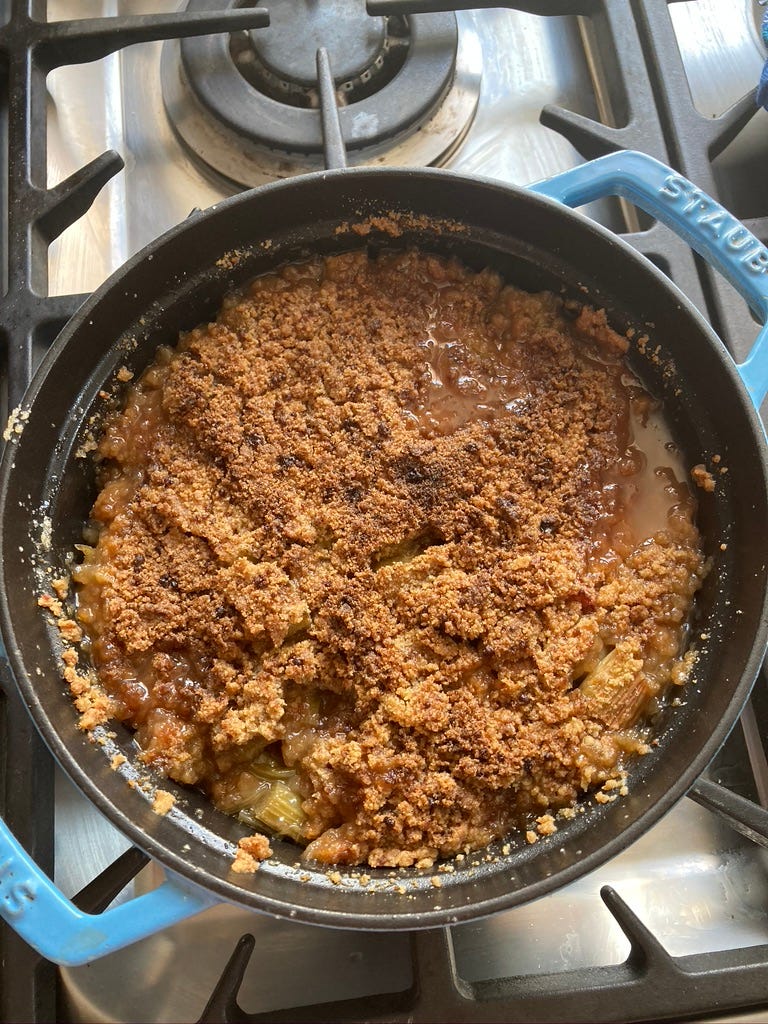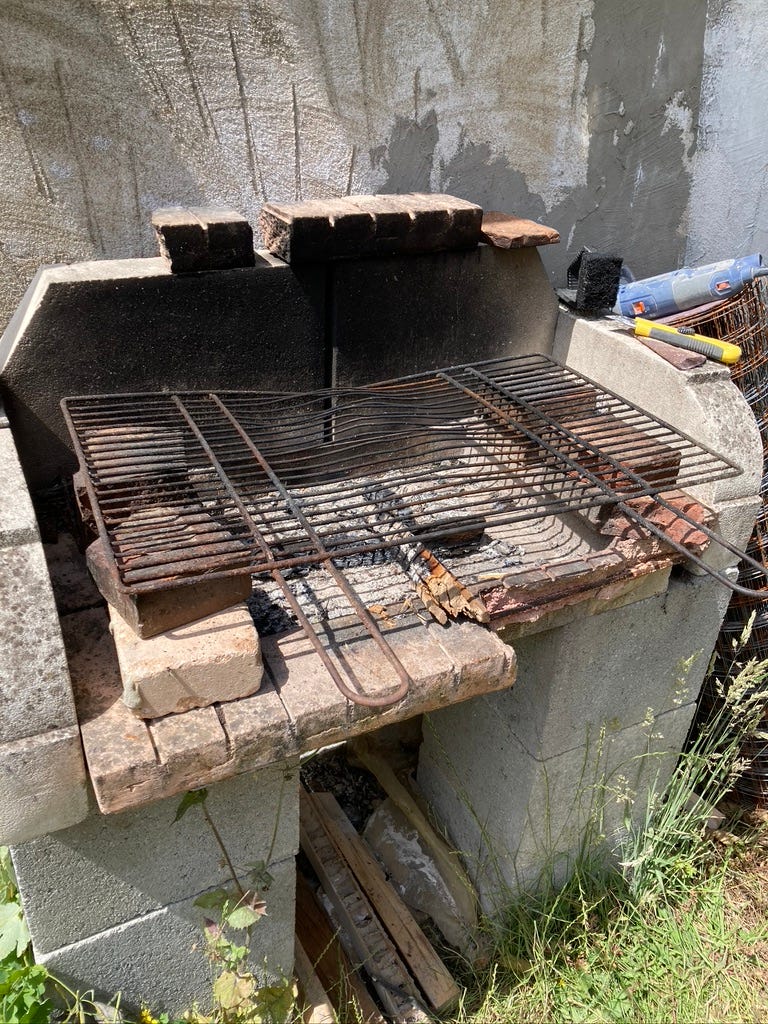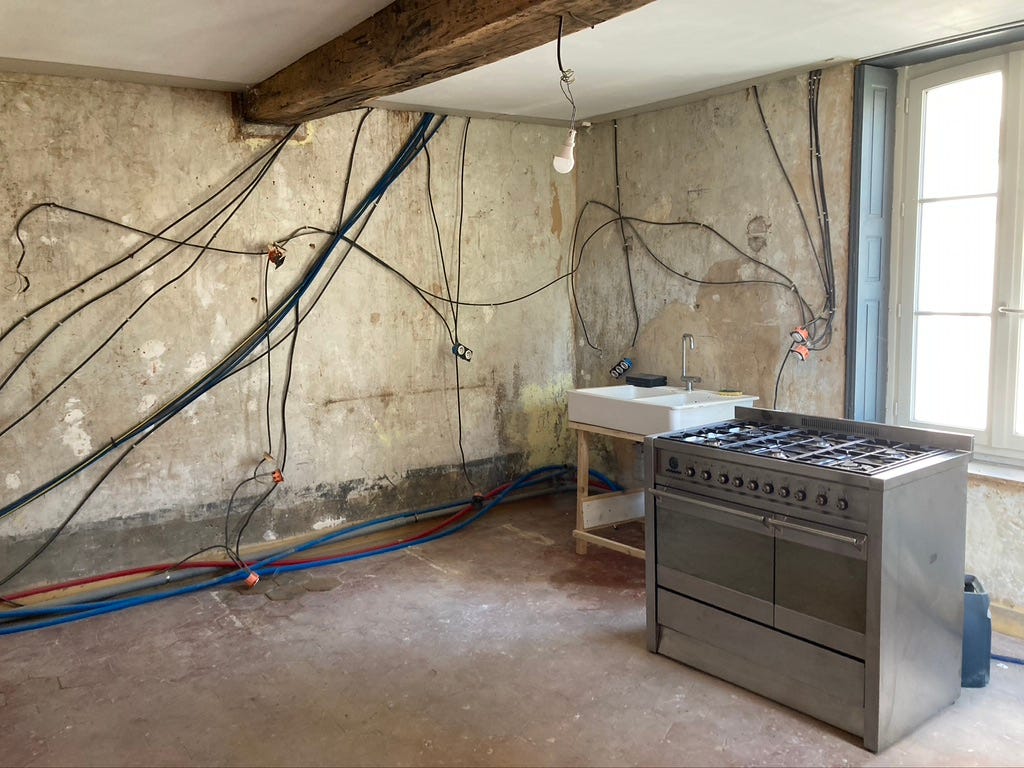Now that Mission: Living Room Floor Tile had liftoff, Lilian and Paul, the two Moldavian builders from Marius’s crew, moved their military-style bedrolls into what would soon become my office upstairs, and got to work on the ground floor. I popped in to meet them a few days before they finished to shake hands, check on their progress and finalize move-in logistics with Marius over the phone. Each in their forties with bashful good manners, Lilian was beefy, tall and jolly, with greying brown hair. Paul was his skinnier, shorter, shyer, blonder counterpart. Though they could have passed for hit men on a B-list TV show, they were assiduously polite. They had already set up a makeshift barbecue in my skanky backyard, and moved a full sized refrigerator into the garden shed. They filled it with kilos of potatoes, and pounds of chicken and sausages, and there were gallon jugs of cooking oil stacked up on the leftover shelves inside. There was a little Nespresso coffee machine, and they had taken one of Monsieur’s lesser récup doors destined for the dump, and turned it into a picnic table for mealtime and coffee breaks. Marius had assured me they did this kind of setup all the time. My guilt for having essentially trapped these guys without their own car on my remote job site six days out of seven was somewhat alleviated.
As Marina had explained, Lilian and Paul would do the tile installation old school, letting the tommettes settle onto a bed of sand and cement before adding the last layer of grout. On that first visit, they had already made great progress. As they went along, they showed themselves to be obsessive and picky and mostly very quiet. But for the fact that they spoke neither English nor French, and I had no Romanian or Russian, or maybe because of it, I thought we might make the ideal roommates.
While the downstairs floor took shape, I hired a man with a van to meet me at my storage unit west of Paris to haul out my bed, desk and a sad little vintage folding chair, the refrigerator I inherited from the Paris house and a big mama SMEG gas range I had just bought secondhand from Le Bon Coin. If I was going to cook 99% of my meals due to a criminal lack of takeout, at least I was going to have proper equipment. This thing was boxy, made out of brushed stainless steel like a 1950s computer, with the horse power of an establishing shot from Yellowstone. When the ovens were fired up, the electric whir of the fans made almost as much noise. Lilian and Paul helped me move it all into the hollowed-out kitchen, where we also put my desk and chair to function as a kitchen table for one.
I needed to keep the furniture minimal for Lilian and Paul, but I didn’t want to get too into the rest of the storage space anyway. It was a mental can of worms, my first reacquaintance with the stuff, mostly clothes, that represented my life before. We would table this confrontation. The minute I left Paris, I had been living in parkas, jeans, rubber boots, and Birkenstocks without much cramping of my style, because I had lost all connection to the concept of style anyway. I wasn’t ready yet to try to come to some sort of rapprochement between me then and me now. (Without getting too ahead of myself, that confrontation with my fashions of yore is still ongoing, though there is no doubt the stilettos will only ever continue to gather dust.)
Once these poky little life essentials were moved in, it was time to abandon the comforts of Saint-Jouin to set up a bedroom campsite at the house with Fred and Penelope, where they would remain confined with me in a sort of demilitarized zone with litter and food to keep them from getting underfoot, and where I could almost walk barefoot. In the car on the way over to the house, which they would now see for the first time, I looked at them, furiously trapped in their shared carrying case once again, and promised them that we were done. No more moves, maybe forever. They glared out at me through the grill of their carrying case. Bullshit, they said to me wordlessly, again. Please get your shit together, we’re over this. Again.
The first morning of job site living, Lilian and Paul had a passel of questions so there was a lot of tapping out basic Google translations on our phones from English into Romanian and vice versa. We passed them back and forth and read the hackneyed, unreadable early AI attempts, throw up our hands and start pantomiming. They were cheerful, stayed to themselves and thankfully had zero expectation of company. Validation of the orientation of bathroom tiles, picking which of the two colors Marius had narrowed down for the bathroom grout, that was it. So as not to run into each other in towels, we scheduled showers in that soon to be overhauled master bathroom, me at midday, and them at night after work. With its early 90s acrylic corner tub, the existing bathroom had the look and feel of a third-tier Silk Road bordello, but when the guys clocked off every day at six, covered in grime and plaster dust, it looked to be enough that the water was hot.
Lilian and Paul FaceTimed with their kids back home in Romania nightly and I imagined they were as eager to be finished as I was. There was never, ever a question of dawdling or drawing out the gig. Once the job was done, Marius told me they’d go back to their families with stacks of cash, only to re-emerge for the next phase of our renovations the following summer. As I saw how carefully they worked, how they started every morning at eight AM on the nose, they became my silent homeboys. Once rhubarb came into season, a few weeks into construction, I’d deliver paper plates of crumble to them out in the backyard at dinnertime. I’d smile and point to the plates, and they’d smile back and give me a thumbs up, and I’d go right back inside. The closest thing I would have to house guests for months, they deserved a treat.

As Lilian and Paul tore the place apart to the blare of accordion-heavy folk music and throaty Russian synthpop, I started spending my days on my bed, trying to keep it relatively free of plaster dust and litter crumbs, with a cardboard box for a desk, alternately working on this ghost writing gig and spying out the window to see if any neighbors emerged. Except for Lucie, occasionally, they didn’t much. Since my house was in no condition for guests, I let her go about her business. The construction noise was sometimes so bad I’d have to go downstairs and sit in my car to conduct interviews. I remember one trip back to Paris during this phase, for some meeting or other, and for the first time, I felt an actual revulsion for it. I figured this was country life kicking in, making the old life a no-go zone if only to keep me focused on what was new and ahead, even if I still didn’t know what that was.
“Ugh I’m so over the city,” I’d say on the phone to my friend Beau, another formerly-Paris-based American journalist who had just moved down south to the Gard with his husband. “It’s dead to me. The people are such assholes.” As if the whole transition were suddenly just settled. I was done with that now. (I wasn’t.)
New surroundings meant new food fetishes. I started stocking up on thin green beans I’d blanche and store in one of the mason jars I took to buying by the dozen in the jam-making section of the supermarket. Look at you, cottage core influencer, I’d say to myself and then forget to take a photo. Those beans were great cold with homemade mayonnaise whipped up in a teacup, or reheated in my cast iron skillet with minced shallots and some of the salty cultured butter from a local farm that every supermarket carried without fail. Cabbage kept well, as did fennel, so I would make massive portions of slaws with as many aromatics as I could get my hands on: dill, basil, coriander, tarragon, sometimes all at once. I had already discovered the cheese abundance of Saint-Jouin, so there was plenty of that too. It did my heart good to see it all in my old refrigerator, now devoid of anyone else’s stuff but mine. It filled up to bursting very quickly.
A daily routine settled in. It was boring and monotonous, but when you are in a period of radical change, monotony is crucial. It anchors you. So like I had back at the mill house, even if I was too maudlin to recognize it, I cherished this little structure I’d cobbled together here. Wake up, put on some slippers and wade through the dust downstairs to make coffee in the kitchen, now also reunited with my giant German super-automatic. Come back upstairs, feed the cats their disgusting-smelling food, spend a half hour writing something, anything. At first it was a fictional rendering of the weird adventure I had embarked on, about a clumsy American woman who found herself in the middle of nowhere, and a mysterious chateau with Nazi gold. It was very junior-level BritBox. As I plodded along, I wasn’t seeing that I had suddenly developed a talent for writing fiction. Even if it was fun to play around in a completely made up world, I’d have turned my nose up at what I had written if I was lucky enough to walk past it in an airport. After a month or so I stopped spinning my wheels and put that away. (And now I’ve pulled it out again, but that’s neither here nor there.) Then there was daily political doomscrolling until I felt restless enough to turn the litterbox to face the window, roll out a mat and do 45 minutes of yoga to combat how sedentary I had become now that I was driving everywhere. It felt good to sweat, even if it meant putting shoes back on for the bath. It made the cheese go down easier.
I also spent a lot of time watching the barn swallows build nests in the top corners of my bedroom windows. They’d dart right up to the glass with morsels of dirt in their sharp little beaks, their tapered wings covered in dark feathers that flashed deep iridescent green when they caught the light. The cats went insane every time, which I loved. The nests looked like nubbly balls of mud from the outside but the birds dropped by a lot, so something was clearly happening inside that I could not see. I hoped it was yet another metaphor.






